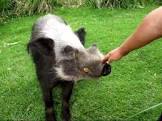- Not acting the part - 24th February 2026
- Death wish - 23rd February 2026
- Return to sender - 20th February 2026
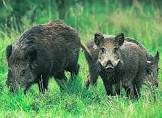
Animal health experts have warned that a population of wild boar on the edge of Wales could be at risk because of unlawful human activity, it has emerged.
The Forest of Dean boar population is the largest in England, and was established in woodlands near Ross-on-Wye after the animals escaped from a farm during the 1990s.
In 2004 a group of around 60 farm-reared animals was also dumped near the village of Staunton on the western edge of the Forest, above the Wye Valley.
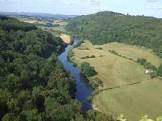
By 2009 the two populations had merged, and it was reported that a breeding one was thriving.
In 2014 the population of wild boar peaked at 1,635, but after culling it was down to just 441 last year, and now comes more disturbing news.
Humans have been feeding the wild boar, and experts are concerned they may unwittingly be introducing African Swine Fever, as well as Foot and Mouth disease.
The deputy surveyor for the Forest Kevin Stannard declared: “Feeding boar is illegal with anything other than proprietary pig food, and so anyone who is feeding wild boar over their garden fence is not only breaking the law, that is the main vector that is going to bring disease such as Foot and Mouth and African Swine Fever into the Forest”.


Another animal expert told The Eye: “You have to be very worried about these wild boar in the Forest of Dean.
“People don’t know – but they may be putting these animals at risk. In effect killing them with kindness!”.
Although the Forest has the biggest population of wild boar in England, it is not the only area that has them in the UK.
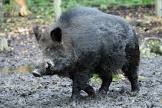
The creatures were first confirmed to be roaming Scotland in the early noughties, and are thought to have either escaped from private collections or been deliberately released by guerrilla rewilders.
They have also attracted unwelcome headlines, although animal experts say much of this so-called ‘information’ is nonsense.
If people read the coverage they might be forgiven for thinking the country had become overrun with mutant, dangerous, sheep-eating feral pigs.

According to the Daily Telegraph for example, the wild boar “eat anything” and “attack humans”, while the local media in Scotland refers to them as a “farmland pest” that “fights back”.
Farming unions have told the BBC that they are frequently seen killing and eating sheep, though there has been little evidence of this.
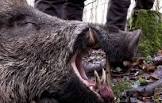
As a farmed animal, they are subject to the Dangerous Wild Animals Act, 1976.
They are, though, not the kind which can be seen on the continent, and that may be their downfall.
The animals are less nervous of people, and they are more productive.
Average litter sizes in the Forest are between six and 10 piglets, nearly twice that of their continental cousins.

With few natural predators, plenty of food (a lot given by humans) and shelter, survival rates for the piglets are thought to be high.
Research also shows that some of the Forest’s wild boar reach sexual maturity in their first year.
Despite the fact that reducing the population by culling is enormously controversial, in 2013 the target became 400 animals.
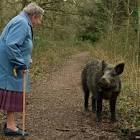
They may not have to take this action in future, though, if the experts are right and feeding the wild boar risks introducing deadly diseases into the population…
The memories of our Editor, Welshman Phil Parry’s decades long award-winning career in journalism (although not including the stories he has covered about animals) as he was gripped by the rare neurological disabling condition Hereditary Spastic Paraplegia (HSP), have been released in a major book ‘A GOOD STORY’. Order the book now!

Regrettably publication of another book, however, was refused, because it was to have included names.
Tomorrow – why the leader of Britain’s police chiefs’ organisation saying that policing is institutionally racist, highlights how in one extraordinary case Wales’ biggest force jailed several innocent black men for murder, when ONE white man actually did it, and now there are growing demands for a legal inquiry into this and other scandals.








